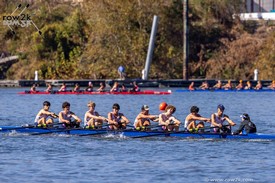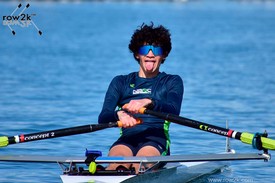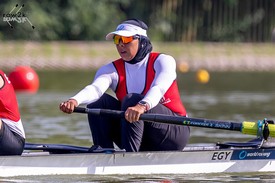It's December, and like most masters rowers, I should be cross-training, sleeping, enjoying time off with the family, and catching up on all the stuff I put off this fall. Unfortunately, my December is just not going that way. I find it almost impossible to stop rowing if I don't have to, like when the river freezes. Intellectually, and physiologically, I know it's good to give my body a break from training, let my muscles rest, do other things, and pull out the yoga DVD. I just can't get excited about yoga, or Pilates even though I know they are good for me, and are activities that I recommend to people all the time. I know that elite athletes have training cycles, and that their coaches force them to take breaks from training.
I recently read an article about Michael Phelps, and he mentioned that he hasn't been in a pool since Beijing. He admitted that he felt kind of “itchy” to get back in the water, but that he's been busy trying to make swimming an exciting sport to watch, and of course fulfilling his sponsors' wishes. What I want to read about is what it's like when he does get back in the pool. Is the first week hell on earth? Is he sore from head to toe? Has his technique suffered from the layoff?
Phelps's coach, Bob Bowman, said that for every day out of the water, it takes two days to get back into competitive form. If that's true for a 23 year old, what's the equation for those of us two and three times older? It's difficult for me to figure out the answer, since I mostly go by personal experience. I know that I hate feeling totally out of shape, and that endorphins make me a more pleasant person to be around.
My personal training cycles are mostly dictated by my health and factors I can't control. When I'm sick or injured, I can't train. I cross-train by swimming all year round, and those breaks occur when the pool is closed. When the river is frozen, I can't row. Maybe I just don't have the psychological well being to take a voluntary break from training. Maybe the gains I make during the rowing season are so slow to happen, so microscopic that I'm afraid that if I stop doing some part of the rowing stroke better, I'll never be able to do it again. With masters athletes there is always the unspoken fear that we will get slower as we get older. That body parts will break not bend.
Fears that linger and fester can immobilize a person. Fears can also be addressed and conquered, and motivate us to keep trying. Maybe that's what training does for me. For me, it's never been about winning medals or sponsorship deals. It's always been about the path to being good enough for me.
If you enjoy and rely on row2k, we need your help to be able to keep doing all this. Though row2k sometimes looks like a big, outside-funded operation, it mainly runs on enthusiasm and grit. Help us keep it coming, thank you! Learn more.
- Bont Rowing
- Calm Waters Rowing
- Concept 2
- Craftsbury Sculling
- The Crew Classic
- CrewLAB
- Croker
- Durham Boat Co.
- Empacher
- Faster Masters
- Filippi
- Fluidesign
- h2row.net
- HUDSON
- Live2Row Studios
- Nielsen-Kellerman
- Oak Ridge RA
- Peinert Boat Works
- Pocock Racing Shells
- Race1 USA
- RowKraft
- Rubini Jewelers
- Vespoli USA
- WinTech Racing
- Bont Rowing
- Calm Waters Rowing
- Concept 2
- Craftsbury Sculling
- The Crew Classic
- CrewLAB
- Croker
- Durham Boat Co.
- Empacher
- Faster Masters
- Filippi
- Fluidesign
- h2row.net
- HUDSON
- Live2Row Studios
- Nielsen-Kellerman
- Oak Ridge RA
- Peinert Boat Works
- Pocock Racing Shells
- Race1 USA
- RowKraft
- Rubini Jewelers
- Vespoli USA
- WinTech Racing

















